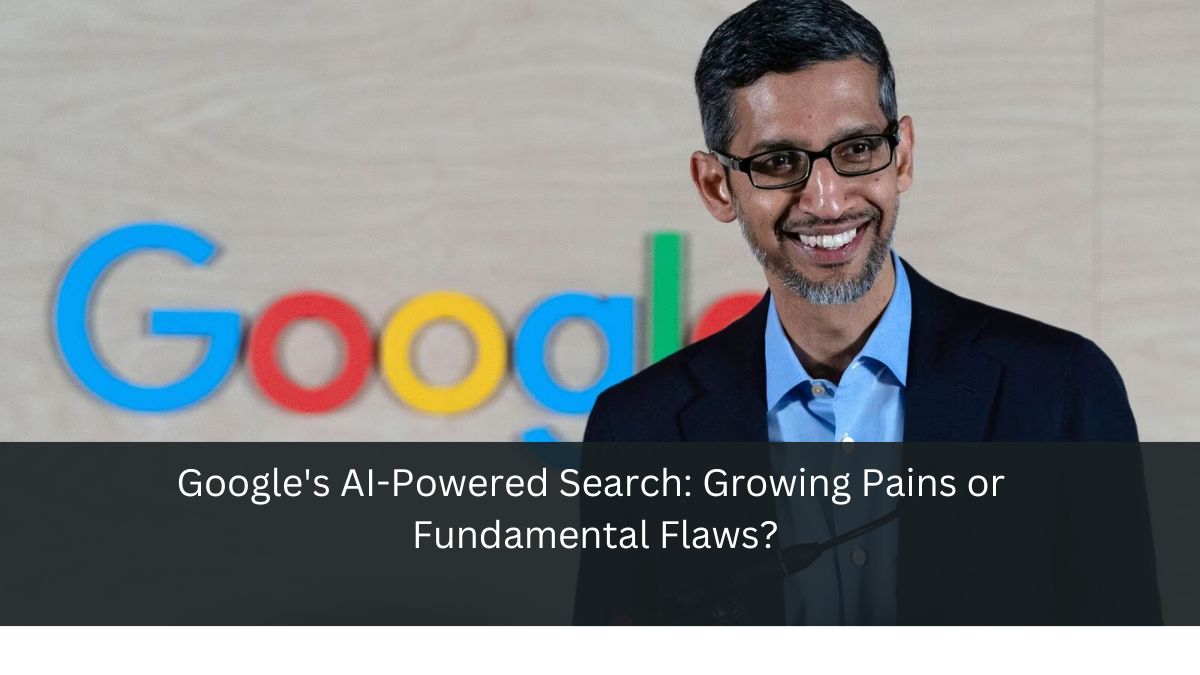AI
Google’s AI-Powered Search: Growing Pains or Fundamental Flaws?

Introduction
In the ever-evolving world of technology, Google has long been at the forefront of innovation, continuously pushing the boundaries of what’s possible in the realm of search. Their latest endeavor, the AI Overview feature, promised to revolutionize the way users interact with search results by providing concise, AI-generated answers to queries. However, as the feature rolls out to a broader audience, it has become increasingly clear that the path to AI-powered search is not without its challenges.
The Promise of AI-Generated Answers
When Google first announced the AI Overview feature, it was met with excitement and anticipation. The prospect of receiving direct, accurate answers to search queries without the need to sift through numerous links seemed like a dream come true. Users envisioned a future where information was more accessible than ever before, and Google was poised to lead the charge.
However, as the old saying goes, “If something seems too good to be true, it probably is.” And in the case of Google’s AI-powered search, the cracks in the foundation are starting to show.
The Pitfalls of AI-Generated Content
As the AI Overview feature made its way into the hands of more users, it quickly became apparent that the technology was far from perfect. From suggesting that users add glue to their pizza to claiming that former US President James Madison graduated from the University of Wisconsin 21 times, the AI-generated answers were often comically incorrect or even potentially dangerous.
These blunders have left many users scratching their heads and questioning the reliability of Google’s AI-powered search. After all, if the tech giant can’t get the basics right, how can we trust it to provide accurate information on more complex topics?
The Challenges of Scaling AI
Google is not alone in its struggle to deliver flawless AI-generated content. Companies like OpenAI, Meta, and Perplexity have all grappled with AI hallucinations and mistakes. However, what sets Google apart is the sheer scale at which it has deployed this technology.
As the world’s most popular search engine, Google processes billions of queries every day. The pressure to incorporate AI into its search results is immense, as competitors like Bing and OpenAI are hot on its heels. But in the rush to stay ahead of the curve, it appears that Google may have prioritized speed over accuracy.
The Human Cost of AI Errors
While it’s easy to laugh at some of the more absurd AI-generated answers, the consequences of these mistakes can be far from humorous. Imagine a scenario where a user, trusting in Google’s authority, follows a misguided AI-generated recommendation and suffers harm as a result. The damage to Google’s reputation and the erosion of user trust could be catastrophic.
As AI expert Gary Marcus points out, “These models are constitutionally incapable of doing sanity checking on their own work, and that’s what’s come to bite this industry in the behind.” It’s a sobering reminder that, for all its potential, AI is still a long way from being infallible.
The Future of AI-Powered Search
Despite the challenges, Google remains optimistic about the future of AI-powered search. The company has stated that the vast majority of AI Overview responses provide high-quality information and that they are actively working to address the issues that have arisen.
However, as the examples of flubs continue to roll in, it’s clear that Google has its work cut out for it. The company must strike a delicate balance between pushing the boundaries of AI and ensuring that the information it provides is accurate and reliable.
Conclusion
Google’s journey into the world of AI-powered search is a testament to the company’s unwavering commitment to innovation. However, as the recent missteps have shown, the path to a truly intelligent search experience is fraught with challenges and potential pitfalls.
As users, we must approach AI-generated content with a healthy dose of skepticism and remain vigilant in our pursuit of accurate information. While the promise of a smarter, more intuitive search experience is undoubtedly alluring, we must not lose sight of the fact that, at least for now, AI is still a work in progress.
Only time will tell if Google can overcome the growing pains of AI-powered search and deliver on its promise of a better, more intelligent search experience. Until then, we must navigate this brave new world with caution and a critical eye, always questioning the information presented to us and seeking the truth for ourselves.
